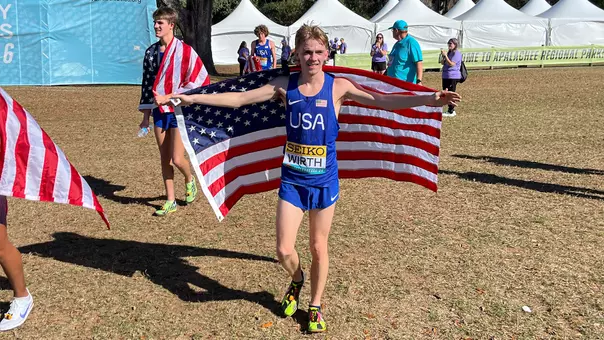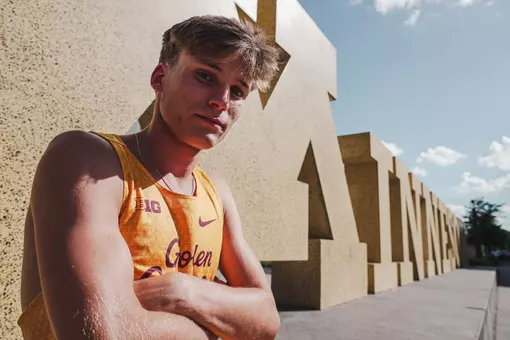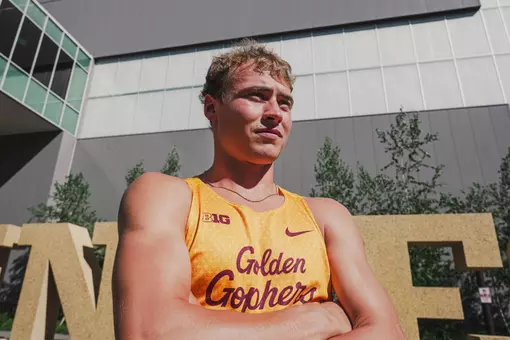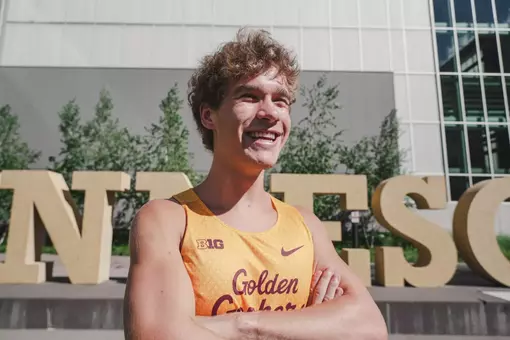University of Minnesota Athletics
Golden Gopher Cross Country Hosts Roy Griak Invitational on Saturday
9/24/2003 12:00:00 AM | Men's Cross Country
The 18th annual running of the Roy Griak Invitational will be run on Saturday, Sept. 27, at the Les Bolstad Course in Falcon Heights, Minn. The meet, the largest cross country meet in the nation, is expected to number close to 2,900 competitors combining all collegiate levels and high school.
2003 Roy Griak Invitational Saturday, Sept. 27 Race Schedule 9 a.m. Women's Maroon III Race 10 a.m. Men's Maroon Race 11 a.m. Women's Maroon II Race 12 noon Men's Gold Race 1 p.m. Women's Gold Race 2 p.m. Boys' High School Race 3 p.m. Girls' High School Race A Minnesota Legend
The Roy Griak is named after a living legend, former Golden Gopher cross country and track coach Roy Griak. Griak has spent the last 40 years with the Minnesota Athletics Department, 33 of those coaching. Since his retirement from the coaching ranks in 1996, Griak has served as the administrative assistant for the men's cross country and track programs. Griak will celebrate his 80th birthday on Oct. 5.
The Price of Admission
Ticket prices for the 2003 Griak are $5 for adults and $2 for youth. Children under 6 years of age are free. No pets will be allowed on the course.
And the Winner is...
Team and individual results of the 2003 Griak Invitational will be placed on two websites: gophersports.com and raceberryjam.com.
The Golden Gophers
The Minnesota men's and women's teams head into the Griak, the second meet of their respective seasons, in a similar position - without their top runner in the lineup. The No. 25-ranked Golden Gopher men's team will be without senior All-American Andrew Carlson, who will miss his second meet with a hip injury. The women have lost two-time All-Midwest Region runner Darja Vasiljeva for the season with a hamstring injury that requires surgery.
The Gopher men's team will rely on All-Midwest Region performers, junior Ryan Ford (and sophomore Ryan Malmin, to take charge in Carlson's absence. Also look for junior to push to the head of the field. Grumstrup was the top Minnesota finisher, placing sixth at the BYU Autumn Classic two weeks ago.
The Golden Gopher women's team features a young team with several freshmen and sophomores stepping forward to lead the team. Redshirt freshman Emily Brown won the Oz Memorial Run two weeks ago and hopes to be force in her first Griak Invitational.
The Largest Griak Expected
Entries indicate the 2003 Roy Griak Invitational will be the largest in the 18-year history of the event. An anticipated 2,900 athletes will compete over the seven races on Saturday. The record stands at 2,233 racers in 2001.
The Griak Gold Race Field
A total of 58 NCAA Division I teams are set to compete in the Gold Races. Nineteen schools (Arizona, Arizona State, Baylor, Boston College, Colorado State, Iowa State, Marquette, Minnesota, Missouri, Montana, Nebraska, Northern Iowa, Providence, Southern Utah, Texas Tech, Utah State, Wake Forest, Washington State and Weber State) will be competing in both the men's and women's Gold Race events. An additional 12 schools, including Wisconsin, Brigham Young, Oregon, Eastern Michigan and Texas, are only competing in the men's race. Defending Big Ten champion Michigan and 2002 Griak champion Michigan State lead a group of eight schools sending just their women's teams to this year's Griak.
The Returning Champions
Both the Gold Races return team champion looking to repeat. Michigan State won the 2002 Women's Gold Race, while Oregon captured its first Griak team title in the Men's Gold Race.
All three Maroon Races have defending champions back as well. Wisconsin-LaCrosse won the Men's Maroon title while Northern Michigan and Carleton ran to the Women's Maroon II and Maroon III Race crowns, respectively.
Three individuals return hoping to win consecutive Griak titles. Brigham Young junior Kip Kangogo won the Men's Gold Race a year ago, while Michigan State's senior Michelle Carson captured the Women's Gold Race crown. The other returning champion, Wartburg (Iowa) junior Missy Buttry captured the 2002 Women's Maroon II title, but will compete in the Women's Gold Race this year. Buttry is the NCAA Division III individual champion.
Griak History
This meet was first contested in 1986 and was named the Minnesota Invitational from 1986-94 and the Norstand Invitational in 1995-96, until it was renamed the Roy Griak Invitational in 1997. The meet has grown from 220 finishers in 1986 to a record 2,233 competitors in 2001.
Two Griak Milestones Surpassed in 2003
Two milestones will be reached during the 2003 Roy Griak Invitational. The 2,000th team will compete and the 20,000th athlete will cross the finish line. Entering the meet, 1,956 teams and 18,746 athletes have competed since the event began in 1986.
Griak Notes of Interest
Only one runner has been able to defend a Griak Men's Gold Race title. Providence's Ben Noad won back-to-back Griak titles in 1997 and 1998. Wisconsin's Matt Tegenkamp won the title in 2001 and is expected to compete this year. Defending champion Brigham Young junior Kip Kangogo also has the opportunity to join Noad as two-time Griak champions.
The Griak Women's Gold Race has also had only one repeat champion, Fran Ten Bensel (Nebraska) in 1991 and 1992.
Other two-time Griak champions are Vladimir Golias (Central Missouri State) - Men's Maroon in 1997 and 1998; Sarah Anderson (Wisconsin-Superior) - Women's Maroon in 1997 and 1998 and Jonah Kiptarus. Kiptarus won the 1994 Men's Maroon title as a member of the Barton County squad, then returned as a Nebraska runner to win the 1996 Men's Gold crown.
Minnesota has two Griak titles to its credit, both on the women's side, with wins in 1988 and 2000. The best finish for the Minnesota men was third in 1997.
The only Golden Gopher to win the individual title was Rasa Michniovaite in 1998. The highest finish from the Golden Gopher men's team was a ninth-place showing by Jeremy Polson in 1997.
Brigham Young's Kip Kangogo set a new Griak record over an 8-kilometer course, winning in a time of 23:38.9 in 2002.
The Women's Gold Race was lengthened from 5K to 6K in 2000. The 2001 champion, Washington's Sabrina Morro, posted the fasted 6K time in Griak history at 20:12.
Wisconsin leads the way with nine Griak men's titles. The women's event has had 11 different teams win in the Griak's 17-year history.
Wisconsin is the only school to win the men's and women's Griak titles in the same year, doing so in 1997.
Of the 31 men's teams that competed in the NCAA Championships in 2002, eight of them ran in the Griak Invitational. Twelve women's teams that competed in the Griak also advanced to the 31-team NCAA Championships.
Roy Griak has missed only one Griak Invitational in its 17-year history. In 2000, Griak missed the meet to attend a once-in-a-lifetime reunion of World War II Army veterans. Griak will be an award presenter at the meet again this year.
Minnesota women's head coach Gary Wilson in is his 19th year with the Golden Gophers. But several coaches bringing teams from the state of Wisconsin have ties to Wilson from his successful coaching stint at Wisconsin-LaCrosse prior to coming to Minnesota. Wisconsin-LaCrosse's men's coach Don Fritsch, Wisconsin-Platteville's Tom Antczak and Wisconsin-Whitewater coach Jeff Miller are former athletes of Wilson's at LaCrosse. Wisconsin-Stevens Point women's coach Len Hill was Wilson's assistant at LaCrosse. Wisconsin-Superior coach Ray Reinertsen was a teammate of Wilson's at Cortland State (N.Y.) in the mid 1960's.
Golden Gopher head men's coach Steve Plasencia, BYU men's head coach Ed Eyestone were two of the three athletes (Illinois head coach Paul Pilkington is the third) who made up the U.S. marathon contingent to the 1995 World Championships in Gottenburg, Sweden.
Four teams have used Griak Gold Race titles to help propel them to NCAA Division I team championships: the Wisconsin men in 1988, the Iowa State men in 1989, the Villanova women in 1989 and the Providence women in 1995.
Four individuals won Griak titles in seasons in which they won the NCAA crown: Villanova's Vicki Huber in 1989, Iowa State's John Nuttall in 1989, Wisconsin's Kathy Butler in 1995 and Providence's Keith Kelly in 2000.
The most athletes to compete in any single Griak race was in 2001, when 508 athletes competed in the Women's Maroon Race. The race was split into Maroon II and Maroon III the next year (2002).
Iowa State won the Men's Gold title in 1989 with 15 points, the only perfect team score in Griak history.
Griak individual titles have been decided by just one second a total of eight times in the past 17 years. The most recent was in 1999 when Sheela Agrawal (Duke) edged Lisa Aguilera (Arizona State) for the Women's Gold title. Minnesota's only Griak medalist, Rasa Michniovaite, also won her race by just a second in 1998.
The two high school races were added to the Griak Invitational in 1994.
Griak Champions - Women 2002 Michigan State 1993 North Carolina State 2001 Arizona State 1992 Wisconsin 2000 Minnesota 1991 Virginia 1999 Providence 1990 Oregon 1998 Arizona State 1989 Villanova 1997 Wisconsin 1988 Minnesota 1996 Providence 1987 Iowa 1995 Providence 1986 Nebraska 1994 Oregon Griak Champions - Men 2002 Oregon 1993 Iowa State 2001 Wisconsin 1992 Adams State 2000 Providence 1991 South Florida 1999 Wisconsin 1990 Iowa State 1998 Providence 1989 Iowa State 1997 Wisconsin 1988 Wisconsin 1996 Wisconsin 1987 Wisconsin 1995 Wisconsin 1986 Wisconsin 1994 Wisconsin Griak Invitational Participation (Numbers reflect full teams and actual race finishers, not entries) Year Teams Runners 2002 220 2,071 7 Races - W. Maroon III added 2001 240 2,233 6 Races 2000 212 1,922 6 Races 1999 188 1,718 6 Races 1998 149 1,434 6 Races 1997 162 1,602 6 Races 1996 154 1,653 6 Races 1995 144 1,514 6 Races 1994 96 1,040 6 Races - 2 H.S. Races added 1993 63 575 4 Races - M. Maroon added 1992 68 628 3 Races 1991 65 565 3 Races 1990 56 491 3 Races 1989 41 385 3 Races - W. Maroon added 1988 36 350 2 Races 1987 35 310 2 Races 1986 27 255 2 Races Totals 1,956 18,746




